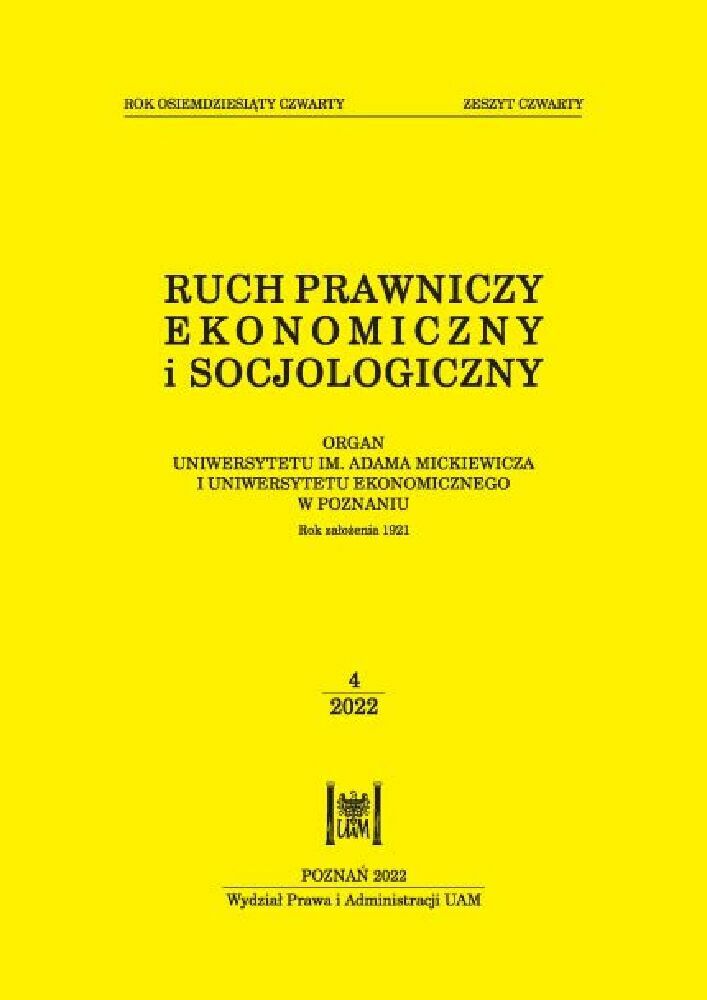Abstract
The article assesses the technical and legal correctness of the legislation of the Act of 20 July 2017 – Water Law, using the logical-linguistic method. The principles of legislative technique included in the form of an annexe to the Ordinance of the Prime Minister of 20 June 2002 on the ‘Principles of Legislative Technique’ are adopted as a point of reference. The analysis of the ways of expressing standards plays a key role both at the stage of preparing and adopting a new law, as well as during the period of its validity, as it allows various shortcomings of the adopted regulations to be revealed. The fact that the Water Law of 2017 has been in force for five years does not, therefore, make it unreasonable to undertake a comprehensive assessment from the point of view of compliance with the rules of legislative technique. In a broader perspective, such an analysis also provides research material for the formulation of theoretical and legal assumptions of the law-making process and their possible verification. The conducted research shows that in the Water Law Act of 2017 there are a few violations of the standards constituting the rules of legislative technique. Most of them do not cause any serious problems in applying the provisions, but there are also some – often overlooked in a cursory reading of the law – which deserve criticism. At issue here are violations of the consistency of the systematics, inconsistencies in the group of formulated prohibitions, which are additionally excessively rigorous in relation to the requirements of European law, dispersing issues between the main act and amending acts, and generally the phenomenon of the overproduction of legal entities, which introduces unnecessary normative noise.
References
Bałaban, A. (2009). Prawna regulacja procesu legislacyjnego, [w:] A. Malinowski (red.), Zarys metodyki pracy legislatora. Ustawy. Akty wykonawcze. Prawo miejscowe. Warszawa: 15–44.
Białek, M., Chojnacki, D., Grabarczyk, T. (2018). Opłaty za usługi wodne w nowym prawie wodnym. Warszawa.
Breuer, R., Gärditz, K.F. (2017). Öffentliches und privates Wasserrecht. München.
Górski, M., Pchałek, M., Radecki, W., Jerzmański, J., Bar, M., Urban, S., Jendrośka, J. (2011). Prawo ochrony środowiska. Komentarz. Warszawa.
Jekel, H. (2017). Der Gewässerzustand in Deutschland. Erfolge und Handlungsbeadrf – zugleich eine Zwischenbewertung de WRL. [Referat na konferencję Aktuelle Entwicklungen bei der Umsetzung der Wasserrahmenrichtlinie, 22. Umweltrechtliches Symposion, 30./31. März 2017]. Leipzig. https://doi.org/10.5771/9783845289342-23 DOI: https://doi.org/10.5771/9783845289342-23
Kłodawski, M., Berek, M. (2017). Dobre praktyki legislacyjne jako pozaprawne źródło techniki prawodawczej. Przegląd Legislacyjny 3(101): 9–34.
Malinowski, A. (2009). Jednoznaczność i precyzja słów w tekście prawnym, [w:] A. Malinowski (red.), Zarys metodyki pracy legislatora. Ustawy. Akty wykonawcze. Prawo miejscowe. Warszawa: 279–313.
Mikulski, Z. (2003). Osiemdziesiąt lat polskiego prawa wodnego 1922–2002. Gospodarka Wodna 11: 448–454.
Osuch-Chacińska, L. (2018). Korzystanie z wód i usługi wodne w świetle przepisów ustawy Prawo wodne z dnia 20 lipca 2017 r. Gospodarka Wodna 10: 300–306.
Piotrowski, R. (2009). Projekt ustawy, [w:] A. Malinowski (red.), Zarys metodyki pracy legislatora. Ustawy. Akty wykonawcze. Prawo miejscowe. Warszawa: 97–120.
Rakoczy, B. (2018). Prawo wodne. Praktyczny przewodnik. Warszawa.
Rotko, J. (2018a). Problem zanieczyszczenia wód śródlądowych substancjami chemicznymi w świetle prawa europejskiego oraz prawa krajowego – uwagi krytyczne. Studia Prawnicze 4(216): 109–136. https://doi.org/10.37232/sp.2018.4.3 DOI: https://doi.org/10.37232/sp.2018.4.3
Rotko, J. (2018b). Kierunki zmian w prawie wodnym w świetle ustawy z dnia 20 lipca 2017 r. – Prawo wodne, [w:] G. Dobrowolski (red.), Rozważania o… Katowice: 329–343.
Rotko, J. (2019). Przyszłość konwencjonalnych elektrowni węglowych w świetle międzynarodowego i europejskiego prawa ochrony środowiska. Krytyka Prawa 11(4): 299–325.
Surowiec, S., Tarasiewicz, W., Zwięglińska, T. (1981). Prawo wodne. Komentarz. Przepisy wykonawcze. Warszawa.
Wronkowska, S., Zieliński, M. (2021). Komentarz do zasad techniki prawodawczej. Warszawa.
License
Copyright (c) 2022 WPiA UAM

This work is licensed under a Creative Commons Attribution-NonCommercial-NoDerivatives 4.0 International License.





